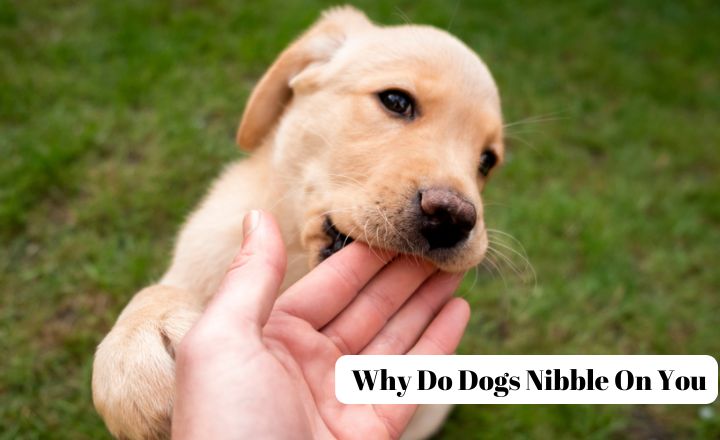Why do dogs nibble on you? Is there a specific reason for this behavior? What if I tell you that there are five of them, with five solutions to stop this behavior?
You are sitting, relaxing, enjoying a meal, or just watching TV when suddenly… you feel something softly biting you. And, of course, it’s your furry friend. What do you think why do dogs nibble on you?
Baby teeth or not, nibbling is a dog behavior that can be cute for the first few times when it happens. But guess what, speaking in the name of those who experience nibbling more frequently… it can start getting on your nerves.
However, since this behavior is harmless, most people find it cute. It is often referred to as dog cobbing because it looks like the dog is cobbing corn. These gentle movements are often accompanied by some cute cobbing sounds.
Let’s See Why Do Dogs Nibble On You:
When it comes to dog behavior, the key thing is to understand the root cause of it. What does my dog want to tell me when it does this?
Let’s take a closer look!
1. Because They Are Just A Baby And Their Teeth Started Growing
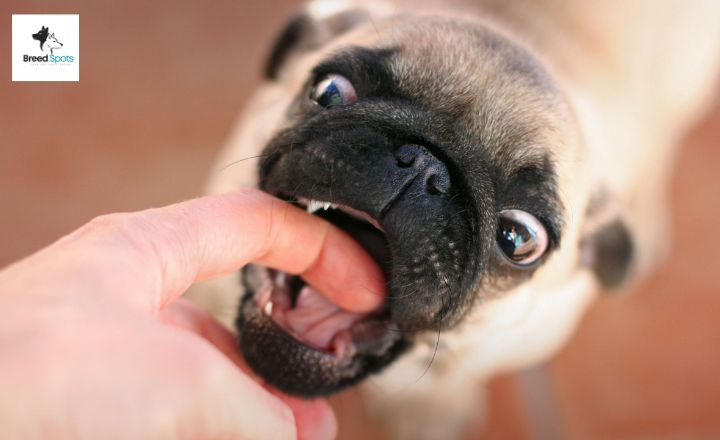
If your puppy is constantly nibbling, the habit might be connected to your pup’s developmental stage that they are in at the moment, which is closely connected to their age.
Every pup goes through a teething period, just like our babies do. Therefore, this nibbling behavior is completely normal.
Puppies start changing their initial set of 28 sharp teeth for 42 permanent adult teeth around the age of 4 to 6 months, which results in many front teeth nibbles.
Also, at this stage, your pup will be obsessed with exploring everything around it. Therefore, those two in combination might seem like too much at the moment. But fear not, because this period goes by fast.
2. It’s Playtime!
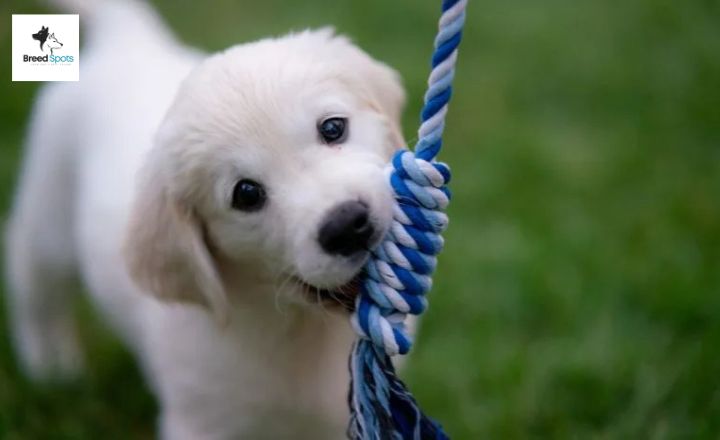
Your dog nibbling on your leg or arm, and then running away is a sign of being in the mood for playing!
Dogs, especially when in their puppy developmental stage, or when they get zoomies, would do anything to tease you enough so you would play with them.
Doing this ‘arousal’ of mimicking a bite, and running away, together with sneezing, is a sign that your dog is trying to explain (in dog language) that they are not trying to be dangerous, but are trying to play.
If your dog does this rather frequently, congratulations. You have a happy and healthy dog that is always up for a fun time.
However, if you find this behavior too boring, there are ways to manage it, which we will talk about in a few paragraphs below.
3. A Way Of Saying ‘I Love You’
Puppies use their lips to sense their surroundings for the first time after birth.
If you spend time looking at dogs while they play, you will see that they display affection by mouthing and nibbling with their mother dogs. They won’t bite each other, but you will frequently see another dog’s head completely in one dog’s mouth.
So, a dog’s playful, gentle nibbles are frequently an indication of their love and care for you. They have learned that with their littermates and their nucleus family, and now they are doing the same with you. Why? Because they consider you their family.
I think this is a very touching sign of affection, which is not connected to aggressive behavior at all. This is a positive indication that your dog is displaying affection for you.
4. They Are Grooming… You.
This is an instinctive, deeply rooted behavior to fight against itching and even eliminate pests like fleas and ticks that could have been stuck on their paws or somewhere in their coat.
What I’m trying to say is – your dog might just be sharing their valuable skills, and trying to make sure that you are pest-free.
This can also be a sign of social grooming, which is a form of grooming that is done in packs. It would be most likely that when they were wild dogs or wolves, they would groom their pack mates, to bond.
5. They Might Be Anxious
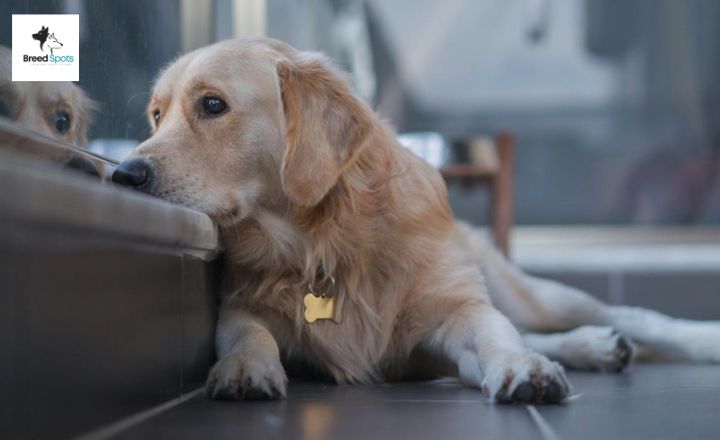
A dog may occasionally use its mouth to indicate to humans or other canines that it is uncomfortable and needs space.
Many factors, such as a change in surroundings, the presence of unfamiliar people or animals in their area (if they are not properly socialized), or a change that causes your dog to feel uneasy or threatened, can cause anxiety in dogs.
A nervous dog nibbles could turn into a biting dog. Pet owners can usually detect additional indications to prevent nervous nibbling.
Now, Let’s See How To Stop This Behavior
If this behavior does not sit right with you, and you feel like it is happening all the time, I have a few options you might consider before you decide on a vet visit.
1. Shift Their Focus
Your pooch might just need a hint that doing other things except nibbling can be fun, too.
Moving their thoughts to other actions is good mental exercise for them. Giving them a good scratch to re-focus their attention on something new is good in such cases.
If they accept your initiative to do something else, I have to inform you that this is a good sign! They are following your lead, therefore eventually eliminating this behavior step by step.
2. It’s Walk Time!
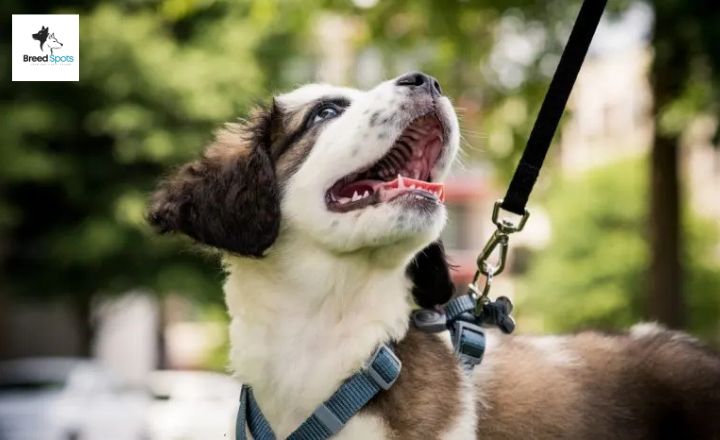
One of the best ways to put a stop to any unwanted behavior is to include additional physical exercise. Whenever your dog has the energy to do “extra” things, it means that they are not tired enough from their walks or playtime.
You don’t exactly have to go for a walk; you can go for a run, a hike, or just play hide and seek or tug of war. Anything that will exhaust them, at least a bit.
You can use various objects to help you, such as interactive dog toys, toys with hidden treats in them, tennis balls, etc.
Regular play will stop this sometimes boring dog’s teeth action.
3. A Treat Whenever They Did Good
Food motivation is one of the best ways to teach your problem nibbler.
Whenever they decide to stop nibbling your skin, make sure to give them a treat, or throw their favorite toy or ball for them to catch and bring back.
This will be a sign from them that they have done something good. Therefore, they will try to earn as many treats as possible. Even if that means to stop nibbling.
4. Buy Them Something They Can Nibble On
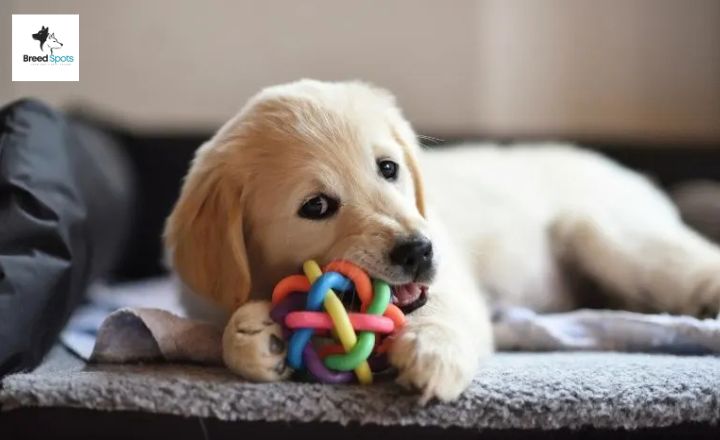
Okay, your dog excessively nibbles. They need something to nibble on. What can you do about that?
Yes, exactly! Get them something they can nibble on (except you or your expensive furniture)!
There are dog toys that serve this purpose, which their human friends would see as a great favor (being an alternative to their limbs).
Just as our babies need something to nibble on in their teething stages, puppies need to. Sometimes, even adult dogs would need it.
5. Go Down The Rabbit Hole To See What Triggered This Behavior
When all of these don’t work, we might want to include a specialist here.
To get a deeper understanding of why dogs constantly nibble, dog parents often seek professional help from veterinarians to try and find the root cause of this behavior.
It might be departing too early from their mom and littermates, might be anxious disorders, you name it. Your vet will name it.
However, finding its common precursors will immensely help.
Things We Need To Differentiate: Nibbling Vs. Biting
In one dog breed, their nibbling is so common and recognizable that it has its name. The pebble nibbles is another name for Pitbull nibbles! These dogs nibble out of pure affection towards you, just as the Rotties growl out of affection.
And there must be a known difference between aggressive behaviors and friendly ones!
When your dog’s teeth “brush” against your skin without actually biting or ruining the skin barrier, it’s called a nibble. The dog may be mouthing with minimum force, using all his teeth or only his front teeth.
Now, Why Is My Dog Nibbling Is A Question Of The Past
We have answered together the reasons why dogs nibble on you, and some possible solutions for that problem, if we can even call it a problem.
Dogs are curious beings that love to explore different textures, but also your reactions and the boundaries you will set for them.
Therefore, having all of this advice, I am sure you are prepared to face this nibbling situation.
Read next: My Dog Ate A Bee, What To Do? 7 Helpful Tips.

